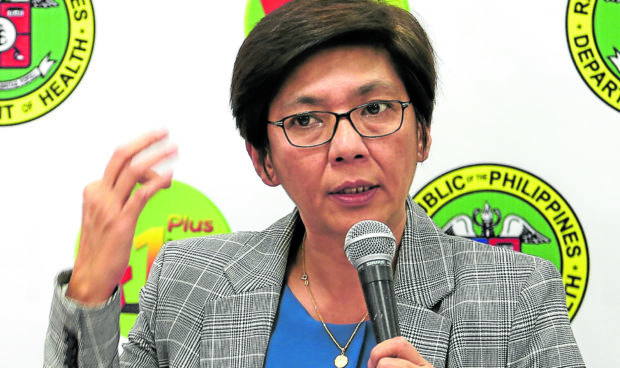
FILE PHOTO: Health Undersecretary Maria Rosario Vergeire. INQUIRER file photo / EDWIN BACASMAS
MANILA, Philippines — The Department of Health (DOH) wants to establish more facilities in other parts of the country that could facilitate genome sequencing needed to detect SARS-CoV-2 variants of concern (VOCs) and variants under investigation (VUIs).
Health Undersecretary Maria Rosario Vergeire said this Friday after Dr. Rontgene Solante, head of the Adult Infectious Diseases and Tropical Medicine unit at the San Lazaro Hospital and member of the country’s Vaccine Expert Panel, pointed out that the number of COVID-19 samples being subjected to genome sequencing is “very low.”
Vergeire said the DOH originally plans to open up more facilities that could conduct genome sequencing for the detection of the variants.
“We would like to expand the capacity for this whole genome sequencing not just here in Metro Manila but also having strategic hubs in the other areas of the country,” she said in an online press briefing.
Vergeire said the DOH also wants that machines at the University of the Philippines – National Institutes of Health (UP-NIH) and the Research Institute for Tropical Medicine (RITM) to be operational to increase the output for genome sequencing.
At present, only the Philippine Genome Center, UP-NIH and RITM have the capacity to conduct genome sequencing in the country, according to Vergeire.
Solante has advised the PGC to coordinate with more facilities to increase sequencing output. At present, the PGC is only able to sequence over 700 samples in one batch.
The DOH earlier explained that it is conducting a “purposive sampling” for the process to ensure a higher likelihood of detecting VOCs and VUIs. This means that more samples are taken from areas, clusters, and groups of people that are likely to have the variants.
The country has so far reported a total of 1,075 B.1351 variant cases (first detected in South Africa), 948 B.1.1.7 variant cases (first detected in UK), 157 P.3 variant cases (first detected in the Philippines), and 2 P.1 variant cases (first detected in Brazil) as of May 3.